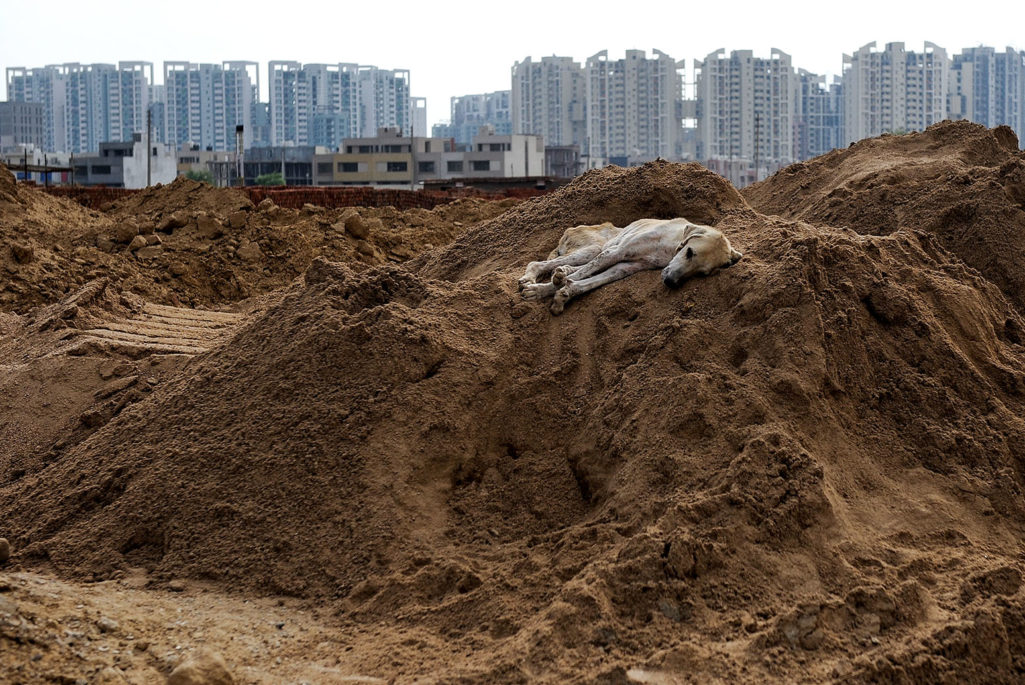Changing the World: Whose Business is it Anyway?

A stray dog sleeps on a pile of mud at a construction site for affordable housing in Gurgaon, some 40 kms from New Delhi on July 9, 2009. Developers in India are turning their attention to middle and lower income buyers and low-cost housing that offers lower profit margins but enjoys much greater demand.
Photo: Manan Vatsyayana/AFP/Getty Images
Changing the world is no longer the sole purview of social reformers, nonprofit organizations, politicians and academics; businesses have now joined the effort. The way companies think about the bottom line has changed dramatically in the last few decades, and now it’s happening in Asia.
Businesses have come to realize that changing society and the way it works produces mutually beneficial results. A company like Levi’s sees itself as not just selling cloth, but ensuring a sustainable planet where the entire supply chain from growing the cotton to the amount of water used to wash the jeans becomes part of its core mission.
If one looks deeper into such a mission, it goes far beyond the “doing good to feel good” factor. When an organization embraces the footprint it leaves on society, it transforms the way it does business, it transforms how it treats its customers, its staff and the kind of people it eventually attracts as top talent.
When we began our work in affordable housing in India many years ago, the objective seemed clear on the surface. More houses in the affordable price range for low-income customers (earning less than $500 a month in household income) were needed, but why was the market not responding?
Further study revealed that providing housing at a higher pay range was easier. Although the unmet demand for affordable housing was high, it didn’t give developers enough incentive to enter the low-cost market. There were smaller developers and small projects in sight, but not enough to meet the market demand for more than 18 million homes. Also, this group of customers was unknown and considered high risk, because they never had a way to prove their income.
To maximize their positive impact, companies must develop coherent corporate social responsibility strategies.
Major developers needed an incentive beyond merely the “doing the right thing” aspect of a social responsibly campaign. They needed to absorb and make low-cost housing development part of their core mission. If a real estate developer made this the central idea of their business, there was not just money to be made, but they were fundamentally changing the lives of all low-income customers. For example, these new housing units would be furnished with indoor toilets. In rural parts of India, where awareness about sanitation has been on the rise, indoor toilets are now considered a requirement for marriages. Parents can more easily have their daughters married when families have toilets in their homes. That’s a small, but significant example of how housing can impact the way lives are being transformed.
Working on affordable housing by a real-estate developer was just one pillar of the effort. The potential buyers needed an equally innovative mortgage provider to treat them with the respect and trust they give to those with an income statement. Everything that is needed to live comfortably in a small space, such as furniture, electronics and electrical equipment also required innovative thinking and cost optimization.
Similarly, organizations that are spending a portion of their profits toward social responsibility have begun to realize that allowing those programs to have little or no alignment with their organizational goals is a huge mistake. To maximize their positive impact on the social and environmental systems in which they operate, companies must develop coherent corporate social responsibility strategies.
The core goal of corporate and organizational social responsibility efforts should be addressing what needs to be done for the larger benefit of all.
How can Social Transformation be Achieved?
The time has come for Asian businesses to incorporate social initiatives into their core mission and centrally focus their vision statement toward social transformation. The social mission will drive the organization forward and help to redefine their relationship with society.
C.K. Prahalad first described the concept in his book “Fortune at the Bottom of the Pyramid.” It has been consistently proven that by adapting products and services for the low-income or marginalized, companies have not only established themselves as leaders in that market segment, but have also pushed their innovation envelope much further. It is not just about adapting the product or service, but changing the way the organization has been sourcing, developing, delivering and maintaining goods and services. It is about owning the entire life cycle of the product or service and not just the end result. It concerns the company and its growth, but about looking at society as a whole. It is about furthering the knowledge of all citizens and not just the stakeholders in the business. It is about fundamentally rewriting the vision and mission statements.
This transformation is not an easy task, particularly in Asia, where economies are growing fast, and companies are scrambling to grow their businesses. It is going to be hard for organizations to re-examine every step of their process. Is it worth it at the end? Will it make the team more successful? Will the employees enjoy their work more?
The answer to these questions is an emphatic “Yes!” It makes the life of the organization more worthwhile and the journey more enjoyable, as it allows for social transformation alongside growing the business.


